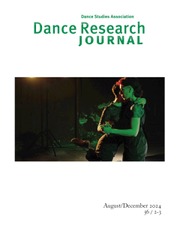Hello, Dear Readers!
When we arrived on the editorial scene in 2021, and in our Foreword to the April 2021 (53:1) issue of Dance Research Journal, we shared information with you about our editorial team, leadership transition, and changes we had made and were planning on making to the journal's editorial processes and procedures in alignment with our values and commitments to advancing the field through the lens of social justice and anti-racist praxis. We would like to take this opportunity to offer an update and chart some new directions for the journal moving forward.
First, we would like to express deep appreciation for the members of our editorial team. We are thrilled to announce that Katie Skinner has just been promoted to Managing Editor of DRJ; Graduate Editorial Assistant Michael Landez graduated from the UI and is pursuing a PhD in Performance Studies at Northwestern University; Cody Norling, who joined our team in late August via a Graduate Research Assistantship from The University of Iowa where he is a PhD candidate in Historical Musicology, has contributed skillfully to our expanded mentoring efforts; and Sariel Golomb's continued excellence has led to a promotion to Editorial Fellow supported by the Dance Studies Association.
Volumes 53 and 54 saw the publication of two special issues: Arms Akimbo: Black Women Choreographing Social Change, edited by Nadine George-Graves (53:2, August 2021), and Speculations on the Queerness of Dance Modernism, edited by Mariama Diagne, Lucia Ruprecht, and Eike Wittrock (54:2, August 2022). The August 2023 issue (55:2), Assembly, Gathering, and Being with Dance, is the result of a collaboration among Thomas F. DeFrantz, Jasmine E. Johnson, and Eric Mullis. We are currently working with two other editorial teams for special issues to be published in 2024 and 2025, details forthcoming.
Since we began, we have taken actions to expand and globalize our advisory bodies with eyes toward including underrepresented voices in the field in helping guide our decision-making and strategic planning, offering a wealth of expertise and perspectives, and assisting in manuscript review and author mentoring. Specifically, since April 2021 we have added to our Editorial Board Adesola Akinleye, Hari Krishnan, Ana Paula Höfling, and Nan Ma, and to our Advisory Board, Mythili Anoop, Dotun Ayobade, ‘Funmi Adewole Elliot, Andrea Harris, Hye-Won Hwang, Megan Nicely, Ariel Osterweis, and Eric Mullis. The recruitment of these members was via self- and peer-nomination to provide more routes into board service and involvement with the journal. We have also seen up-close the impact of having diverse voices at the table and the ways board members’ perspectives and our conversations have shaped our decisions. We want to express our deep gratitude to our boards for their engagement and assistance.
Embracing the Dance Studies Association's and field's charges to promote anti-racism and decolonization through research that advances the causes of social justice, we are dedicating extra editorial time and labor to mentor authors at all stages of the process, and authors at all stages of their careers, towards aligning their work with these goals in mind. We have been pushing back on scholarship that uses race as an additive, as a tack-on, or as a coda, and asking for deeper critical approaches from authors when they make claims about their engagement with race and anti-racist praxis. We are committing the time and labor required to change the frameworks through which we see, interpret, analyze, and understand race as integral to embodied knowing and knowledge claims.
Authors submitting their work to DRJ should expect a robust engagement with our editorial team and board members. We are dedicated to providing feedback for submitted manuscripts that we find promising, even if they aren't ultimately forwarded through the double-blind peer-review process. In these cases, we are intentionally intervening early in the editorial process in helping authors shape manuscripts that we believe will have a better chance of moving into peer review. We are also devoting time and attention in developing promising submissions by authors whose first language is not English. Additionally, hoping to make the peer-review process as useful as possible for authors, we have formulated guidelines and suggestions to assist manuscript reviewers toward optimal feedback for authors.
Our commitment to anti-racist praxis is ongoing with respect to our prioritization of the work we are publishing and the lenses through which we are reading submissions and assigning them to reviewers. We expect that authors will consider our mission and priorities when submitting their work to DRJ, and that they enter the conversation with our editorial team and expert reviewers with an open mind and patience for the process, which sometimes includes meeting with the Executive Co-Editors. We recognize that the result of this work may mean an extended timeline for publication and are grateful to the authors who have engaged with us. We believe that their work, and our field writ large, have benefitted as a result.
In all, we are approaching our roles and work with care and commitment to doing our part in making a transformative difference to shining a light on underrepresented voices and subjects, and the methods and outcomes that flourish as a result.


